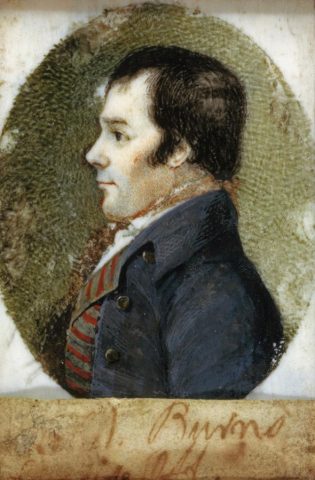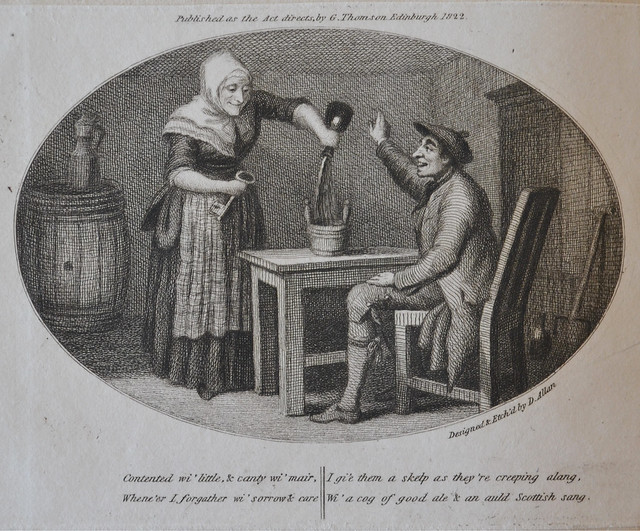
As the poet himself said, “Contented Wi’ Little, And Cantie Wi’ Mair” (Contented with little and jolly with more) is the self-portrait in verse by Robert Burns, who wrote in November 1794; according to the author’s intentions it should have been associated with the profile portrait that Alexander Reid will make to him the following summer: in order that the portrait of my face and the picture of my mind may go down the stream of Time together“.
Come ebbe a dire il poeta stesso, ” Contented Wi’ Little, And Cantie Wi’ Mair ” (Contento con poco e felice con più) è l’autoritratto in versi di Robert Burns, che scrisse nel novembre del 1794; secondo le intenzioni dell’autore avrebbe dovuto essere associato al ritratto di profilo che Alexander Reid gli farà nell’estate successiva ‘di modo che il ritratto del mio viso e l’immagine della mia mente possano passare attraverso il fiume del tempo insieme“.
The song title condenses Burns’s philosophy toward life in general.
Il titolo della canzone condensa la filosofia di Burns verso la vita in generale.
EXCISE MAN [L’UOMO DELLE TASSE]
Alexander Reid’s miniature portrait belongs to the last eighteen months of Burns’s life, when he was working as an excise officer in Dumfries, in fact, although the publication of his works had opened for him the salons of the Edinburgh intellectual elite, his economic situation remained unstable. As a tax collector (since 1789) he could enjoy a stable income, but never stopped writing poetry and songs. He contributed, refusing any compensation, with over 200 songs to the update of the Johnson’ Scots musical museum (1787-1803) and to the Select collection of original scottish airs by G. Thomson (1793-1805).
Il ritratto in miniatura di Alexander Reid risale agli ultimi diciotto mesi della vita di Burns, quando lavorava come ufficiale delle accise a Dumfries, infatti per quanto la pubblicazione delle sue Opere gli avesse aperto i salotti dell’elitè intellettuale di Edimburgo, la sua situazione economica rimase sempre instabile. Nella veste di esattore delle tasse (dal 1789) poteva godere d’un’entrata stabile ma non smise mai di scrivere poesie e canzoni. Contribuì, rifiutando ogni compenso, con più di 200 canzoni all’aggiornamento dello Scots musical museum di J. Johnson (1787–1803) e alla Select collection of original scottish airs di G. Thomson (1793–1805).
Tune “Lumps o’ Puddin”
Johnson (1984) believes this popular tune to be a 17th century English country dance tune, though it was claimed by both England and Scotland. It was published in Henry Playford’s Dancing Master [1] editions of 1701 through 1728, the Sinkler Manuscript (1710, as “Sweet Pudding”), parodied in John Gay’s Beggar’s Opera (1728, as “Thus I stand like the Turk with his doxies around”), Oswald’s Caledonian Pocket Companion (c. 1756, vol. 2, p. 4), D’Urfey’sWit and Mirth:Pills to Purge Melancholy (vol. VI, 1720, song and tune), Walsh’s Caledonian Country Dancing Master, No. 45, and the Gillespie Manuscript of Perth (1768). The melody also appears in several Welsh manuscripts. (from here)
Johnson (1984) ritiene che questa melodia popolare sia una contraddanza inglese del XVII secolo, sebbene sia stata rivendicata sia dall’Inghilterra che dalla Scozia. È stata pubblicata nelle edizioni Dancing Master di Henry Playford dal 1701 al 1728, nello Sinkler Manuscript (1710, come “Sweet Pudding”), parodiata in Beggar’s Opera di John Gay (1728, come “Thus I stand like the Turk with his doxies around”), Caledonian Pocket Companion di Oswald (1756 circa, vol 2, 4), Wit and Mirth: Pills to Purge Melancholy di D’Urfey (volume VI, 1720, canzone e melodia), Caledonian Country Dancing Master di Walsh, n. 45, e il Gillespie Manuscript of Perth (1768). La melodia appare anche in diversi manoscritti gallesi.
Susanna Borsch & Adrian Brown live 2014
CONTENT WITH LITTLE
Although the people in Scotland were often poor, many were contented with what little they had (many also emigrated for a better life). Tradition noted that Ribert Burns wrote “Content wi ‘little” in a moment of hope, when misfortune seemed inclined to stop raging against him, he hopes for economic independence while keeping “sorrow and care” at bay with a drink and a song.
Anche se gli Scozzesi erano spesso poveri, molti erano contenti del poco che avevano (e molti emigravano per una vita migliore). La tradizione annota che Robert Burns scrisse “Content wi ‘little” in un momento di speranza, quando la sfortuna sembrava incline a smettere di accanirsi contro di lui, egli spera nell’indipendenza economica, tenendo a bada nel frattempo “sorrow and care” con un brindisi e una canzone.

David Allan illustration:
Allan depicts a smiling man seated at a table raises his hand, possibly to signal to a woman that she can stop pouring the generous quantity of wine we can see flowing from the bottle she holds. This indicates that he is “contented” with what he has – and of course he would be “canty” if he had more! or perhaps the hand indicates that he is giving a “skelp” to “sorrow & care” (from here)
[Allan ritrae un uomo sorridente seduto a un tavolo che alza la mano, forse per segnalare alla donna che può smettere di versare la generosa quantità di vino che possiamo vedere scorrere dalla bottiglia che tiene in mano. Ciò indica che è “contento” di ciò che ha – e ovviamente sarebbe “canty” (felice) se ne avesse di più! O forse la mano indica che sta dando uno “schiaffo” a “dolore e tristezza”]
John Morran
Shira Kammen 2006
Chorus Contented wi’ little, and cantie (1) wi’ mair, Whene’er I forgather wi’ Sorrow and Care, I gie them a skelp (2) as they’re creeping alang, Wi’ a cog (3) o’ gude swats and an auld Scottish sang. I I whiles (4) claw (5) the elbow o’ troublesome thought (6); But Man is a soger (7), and Life is a faught (8); My mirth and gude humour are coin in my pouch (9) And my Freedom’s my Lairdship nae monarch dare touch.(10) II A townmond (11) o’ trouble, should that be may fa’ (12), A night o’ gude fellowship sowthers (13) it a’: When at the blythe end o’ our journey at last, Wha the deil ever thinks o’ the road he has past? III Blind Chance (14), let her snapper and stoyte (15) on her way; Be’t to me, be’t frae me, e’en let the jade gae (16): Come Ease, or come Travail, come Pleasure or Pain, My warst word is: “Welcome, and welcome again!” |
Traduzione italiano Cattia Salto coro Contento con poco e felice con (poco) più, ogni volta che si riuniscono dolore e tristezza, io li colpisco, / mentre avanzano strisciando, con un barilotto di buona birra e una vecchia canzone scozzese I A volte afferro per il gomito le preoccupazioni ma l’uomo è un soldato e la vita una lotta; la mia allegria e il senso dell’umorismo sono monete sonanti e la mia Libertà è il dominio che nessun sovrano oserà toccare. II Un anno di guai dovrebbe essere molto, una notte in buona compagnia rimette tutto a posto: quando finalmente e felicemente alla fine del nostro viaggio, chi diavolo penserà ancora alla strada che ha trascorso? III Cieca Fortuna, lasciala inciampare e barcollare per la sua strada, Sia a me, sia da me, che vada pure la vecchia! Che venga l’Agiatezza o il Travaglio, che venga il Piacere o il Dolore, la mia peggior parola sarà: – “Benvenuta, e benvenuta ancora!” |
NOTE
English translation from here
1) cantie=jolly: excess of good spirit to the point of bursting into song; jolly with (little) more
[eccesso di buonumore al punto da mettersi a cantare]
2) skelp=smack
3) cog o’ gude swats= pot (keg) of good new ale
4) whyles=sometimes
5) claw=clasp
6) letteralmente “il pensiero fastidioso”
7) sodger=soldier
8) faught=fight
9) letteralmente “monete in tasca”
10) if one is a slave he is not free and therefore not happy [se uno è schiavo non è libero e quindi non è felice]
11) towmond=twelvemonth
12) fa’=lot
13) sowthers=puts to rights
14) Blind Chance is the Lady Luck of the Latins, blind because she distributes her favors / fruits without looking at anyone’s face. It is the pure chance without necessity or purpose in the unfolding of events. The opposed concept of Fate (a supernatural force capable of directing events) [è la Dea Bendata dei latini, cieca perchè distribuisce i suoi favori/frutti senza guardare in faccia a nessuno. E’ la fortuna cieca cioè il puro caso privo di necessità o finalità nello svolgersi degli eventi. La visione si oppone al concetto di Fato (una forza soprannaturale capace di orientare gli eventi)]
15) snapper and stoyte=stumble and stagger
16) jade=name for a worn out horse, a jade, old nag= a woman past her prime; gae=go
LINK
http://www.rampantscotland.com/poetry/blpoems_contented.htm
https://thesession.org/tunes/8651
https://tunearch.org/wiki/Annotation:Lumps_of_Puddings_(2)
http://www.robertburnsfederation.com/poems/translations/contented_wi_little.htm
http://www.robertburns.org/encyclopedia/ReidofKirkennanAlexander17471511823.734.shtml
